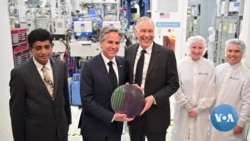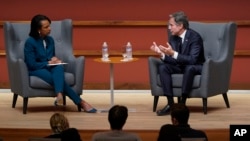ການເດີນທາງໄປຢ້ຽມຢາມ ຊິລິຄອນ ວາລເລ (Silicon Valley) ພາຍໃນອາທິດນີ້ ຂອງລັດຖະມົນຕີກະຊວງການຕ່າງປະເທດ ທ່ານແອນໂທນີ ບລິງເກັນ ມີຂຶ້ນໃນລະຫວ່າງທີ່ລັດຖະບານຂອງທ່ານໄບເດັນ ກໍາລັງສົ່ງເສິມການລົງ ທຶນທາງດ້ານເທັກໂນໂລຈີ, ແຕ່ກໍໄດ້ອອກຂໍ້ຫ້າມຈໍາກັດຫຼາຍຢ່າງ ໃນການຂາຍເທັກໂນໂລຈີໃຫ້ແກ່ທຸລະກິດໃນປະເທດຈີນ. ມິເຊລ ກວີນ (Michelle Quinn) ມີລາຍງານກ່ຽວກັບເລື້ອງນີ້, ເຊິ່ງ ທິບສຸດາ ຈະນໍາເອົາລາຍລະອຽດມາສະເໜີທ່ານໃນອັນດັບຕໍ່ໄປ.
ລັດຖະມົນຕີການຕ່າງປະເທດສະຫະລັດ ທ່ານບລິງເກັນ ກ່າວໂອ້ລົມສົນທະນາກັບອະດີດລັດຖະມົນຕີກະຊວງການຕ່າງປະເທດ ທ່ານນາງຄອນໂດລິຊາ ໄຣສ໌ (Condoleezza Rice) ຢູ່ທີ່ມະຫາວິທະຍາໄລສແຕນຝອດ.
ຂໍ້ຄວາມຂອງທ່ານສົ່ງເຖິງບັນດານັກສຶກສາ ແລະຄະນະຄູອາຈານບໍ? ເທັກໂນໂລຈີມີບົດບາດອັນສໍາຄັນ ທີ່ທ້າທາຍຕໍ່ດ້ານພູມສາດການເມືອງໃນທົ່ວໂລກ.
ທ່ານແອນໂທນີ ບລິງເກັນ, ລັດຖະມົນຕີກະຊວງການຕ່າງປະເທດຂອງສະຫະ ລັດກ່າວວ່າ:
“ພວກເຮົາຢູ່ໃນຊ່ວງເວລາຂອງການແຂ່ງຂັນທີ່ດຸເດືອດ ເພື່ອຫຼໍ່ຫຼອມຕໍ່ສິ່ງທີ່ຈະເກີດຂຶ້ນໃນອະນາຄົດ. ເທັກໂນໂລຈີ, ນະວັດຕະກໍາໃໝ່, ການດໍາເນີນທຸລະກິດ ສິ່ງເຫຼົ່ານັ້ນຄືປັດໄຈອັນສໍາຄັນ ນີ້ຄືວິທີການຟື້ນຟູລະບົບເສດຖະກິດຄືນໃໝ່ເພື່ອອະນາຄົດ. ນີ້ຄືວິທີການປັບປຸງກອງທັບໃຫ້ທັນສະໄໝຕາມທີ່ມີຄວາມຈໍາເປັນ.”
ການເດີນທາງຂອງທ່ານບລິງເກັນ ມີຂຶ້ນໃນຂະນະທີ່ລັດຖະບານຂອງທ່ານໄບເດັນກໍາລັງເລີ້ມຈັດຕັ້ງປະຕິບັດ ການດໍາເນີນງານກ່ຽວກັບ ຊິບ ແລະວິທະຍາ ສາດ, ມີການວາງແຜນໃຊ້ເງິນຫຼາຍຕື້ໂດລາເພື່ອຜັກດັນໃສ່ການຄົ້ນຄວ້າ ແລະການຜະລິດຊີມີຄອນດັກເຕີ້ພາຍໃນປະເທດ. ໃນຊ່ວງຕົ້ນເດືອນຕຸລານີ້, ລັດຖະ ບານ ໄດ້ອອກຂໍ້ກໍານົດກ່ຽວກັບການຄວບຄຸມການສົ່ງອອກ ໂດຍປ້ອງກັນການສະໜອງຊີມີຄອນດັກເຕີ້ ໃນການສົ່ງໄປຂາຍໃຫ້ຈີນບາງອັນ ເພື່ອຂັດຂວາງຄວາມສາມາດຂອງປະເທດດັ່ງກ່າວ ໃນການນໍາໃຊ້ຊີມີຄອນດັກເຕີ້ເຂົ້າໃຊ້ໃນດ້ານການທະຫານຂອງພວກເຂົາ.
ທ່ານແອນໂທນີ ບລິງເກັນ ກ່າວວ່າ:
“ມີພຽງບໍ່ເທົ່າໃດປະເທດເທົ່ານັ້ນ ທີ່ຜະລິດຊີມີຄອນດັກເຕີ້ໃນລະດັບສູງສຸດ ຫຼື ຜະລິດເຄື່ອງມືສໍາລັບຜະລິດຊີມີຄອນດັກເຕີ້ໃນລະດັບສູງທີ່ສຸດ. ພວກເຮົາຕ້ອງ ການເຮັດໃຫ້ໝັ້ນໃຈວ່າ ພວກເຮົາຈະຮັກສາສິ່ງເຫຼົ່ານັ້ນ ໃຫ້ມັນຢູ່ໃນບ່ອນທີ່ມັນສົມຄວນຈະຢູ່.”
ນັກວິເຄາະທາງດ້ານອຸດສາຫະກໍາກ່າວວ່າ ຂໍ້ຈໍາກັດອັນໃໝ່ເຫຼົ່ານີ້ ຈະມີຜົນກະ ທົບຕໍ່ພື້ນຖານອັນສໍາຄັນຂອງບາງບໍລິສັດເທັກໂນໂລຈີຢູ່ໃນສະຫະລັດ. ສາດ ສະດາຈານທາງດ້ານກົດໝາຍຂອງສແຕນຝອດ ທ່ານເນັດທ໌ ເພີຊີລລີ (Nate Persilly) ກ່າວວ່າ ການເດີນທາງໄປ ຊີລີຄອນ ວາລເລ ຂອງທ່ານບລິງເກັນ ເປັນການເນັ້ນໜັກເຖິງຄວາມສໍາຄັນກ່ຽວກັບອຸດສາຫະກໍາເທັກໂນໂລຈີ ເມື່ອມັນກາຍມາເປັນຄວາມທ້າທາຍທາງດ້ານພູມສາດການເມືອງ.
ທ່ານເນັດທ໌ ເພີຊີລລີ, ຈາກສູນກາງນະໂຍບາຍທາງດ້ານໄຊເບີ້ຂອງສແຕນຝອດ ກ່າວຜ່ານຊູມວ່າ:
“ໃນລະຫວ່າງທີ່ພວກເຮົາມັກຈະພາກັນຄິດວ່າ ບໍລິສັດຕ່າງໆຢູ່ທີ່ນີ້ເປັນພຽງບໍລິ ສັດທີ່ຜະລິດ ຜະລິດຕະພັນບາງຢ່າງ, ແນ່ນອນ ຜະລິດຕະພັນດັ່ງກ່າວ, ບໍ່ວ່າມັນຈະເປັນຊີມີຄອນດັກເຕີ້ ຫຼື ມຸມມອງກ່ຽວກັບພື້ນຖານໂຄງລ່າງທາງດ້ານເທັກໂນໂລຈີອື່ນໆ ແມ່ນມີຄວາມກ່ຽວພັນກັບປະເດັນຂອງສັນຕິພາບ ແລະສົງຄາມຢູ່ໃນທົ່ວໂລກ, ແລະປະເດັນການພົວພັນທາງດ້ານສາກົນ. ດັ່ງນັ້ນ, ລັດຖະມົນຕີກະຊວງການຕ່າງປະເທດ ແລະບຸກຄົນອື່ນໆໃນຄະນະລັດຖະບານ ຈຶ່ງຮັບຮູ້ວ່າ ພວກເຂົາເຈົ້າຈໍາເປັນຈະຕ້ອງມີນະໂຍບາຍພິເສດຕ່າງໆ ສໍາລັບລັກສະນະຂອງອຸດສາຫະກໍາເຫຼົ່ານີ້.”
ໃນຂໍ້ຄວາມຂອງທ່ານທີ່ວ່າ ວໍຊິງຕັນ ແລະ ຊີລີຄອນ ວາລເລ ຈໍາເປັນຕ້ອງມີການປັບປຸງໃຫ້ດີຂຶ້ນກວ່າເກົ່າ, ທ່ານບລິງເກັນ ໄດ້ເນັ້ນກ່ຽວກັບນະໂຍບາຍທາງດ້ານດິຈີຕອລ ແລະຊ່ອງຫວ່າງທາງໄຊເບີ້ ຂອງກະຊວງການຕ່າງປະເທດ ໃນປີທໍາອິດນີ້ ເຊິ່ງຈະກໍານົດໃນສິ່ງທີ່ທ່ານຮ້ອງວ່າ “ການເຊື່ອມຕໍ່ ແບບມື້ຕໍ່ມື້” ກັບລະບົບນິເວດຂອງຊີລີຄອນວາລເລ.
Secretary of State Antony Blinken’s visit to Silicon Valley this week comes as the Biden administration is promoting more investment in technology but also enacting more restrictions on selling technology to businesses in China. Michelle Quinn reports.
Secretary Blinken spoke at Stanford University in a conversation with former Secretary of State Condoleezza Rice.
His message to the students and faculty? Technology plays a critical role in geopolitical challenges around the world.
Antony Blinken, Secretary of State
“We’re in a moment of intense competition to shape what comes next. Technology, innovation, entrepreneurship. They are at the heart of that. This is how we’re going to retool economies, for the future. This is how we’re going to modernize militaries, as necessary.”
Blinken’s trip comes as the Biden administration is starting to implement the CHIPS and Science Act, billions of dollars slated to boost domestic semiconductor research and manufacturing. Earlier this month, the administration issued export controls preventing some semiconductor suppliers from selling to China to hamper that country’s ability to develop chips and use them in its military.
Antony Blinken, Secretary of State
“There are only a small number of countries that either are manufacturing the highest-end semiconductors or making the tools to manufacture the highest-end semiconductors. We want to make sure we keep those where they need to be.”
Industry analysts say the new restrictions will hurt some U.S. technology firms’ bottom line. Stanford law professor Nate Persily says Blinken’s Silicon Valley trip underscores the importance of the technology industry when it comes to geopolitical challenges.
Nate Persily, Stanford Cyber Policy Center in Zoom
“While we tend to think of the companies here as just producing some kind of product, actually that product, whether it's semiconductors or other aspects of the technological infrastructure, has worldwide implications for issues of peace and war, issues for international relations. And so the secretary of state and others in the government recognize that they sort of have to have special policies for these kinds of industries.”
In his pitch that Washington and Silicon Valley need to be better aligned, Blinken pointed to a first this year, the State Department’s Bureau of Cyberspace and Digital Policy, which will provide what he calls “day in, day out connectivity” with the Silicon Valley ecosystem.







